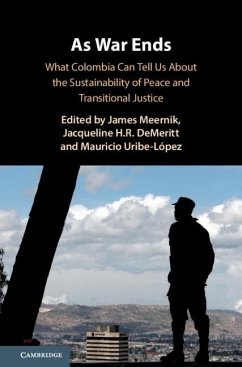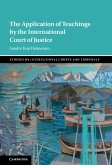As War Ends (eBook, PDF)
What Colombia Can Tell Us About the Sustainability of Peace and Transitional Justice
Redaktion: Meernik, James; Uribe-Lopez, Mauricio; Demeritt, Jacqueline H. R.
27,95 €
27,95 €
inkl. MwSt.
Sofort per Download lieferbar

14 °P sammeln
27,95 €
Als Download kaufen

27,95 €
inkl. MwSt.
Sofort per Download lieferbar

14 °P sammeln
Jetzt verschenken
Alle Infos zum eBook verschenken
27,95 €
inkl. MwSt.
Sofort per Download lieferbar
Alle Infos zum eBook verschenken

14 °P sammeln
As War Ends (eBook, PDF)
What Colombia Can Tell Us About the Sustainability of Peace and Transitional Justice
Redaktion: Meernik, James; Uribe-Lopez, Mauricio; Demeritt, Jacqueline H. R.
- Format: PDF
- Merkliste
- Auf die Merkliste
- Bewerten Bewerten
- Teilen
- Produkt teilen
- Produkterinnerung
- Produkterinnerung

Bitte loggen Sie sich zunächst in Ihr Kundenkonto ein oder registrieren Sie sich bei
bücher.de, um das eBook-Abo tolino select nutzen zu können.
Hier können Sie sich einloggen
Hier können Sie sich einloggen
Sie sind bereits eingeloggt. Klicken Sie auf 2. tolino select Abo, um fortzufahren.

Bitte loggen Sie sich zunächst in Ihr Kundenkonto ein oder registrieren Sie sich bei bücher.de, um das eBook-Abo tolino select nutzen zu können.
A comprehensive and timely analysis of the prospects for peace and justice in Colombia.
- Geräte: PC
- mit Kopierschutz
- eBook Hilfe
- Größe: 7.66MB
- FamilySharing(5)
Andere Kunden interessierten sich auch für
![Cambridge Handbook of European Monetary, Economic and Financial Integration (eBook, PDF) Cambridge Handbook of European Monetary, Economic and Financial Integration (eBook, PDF)]() Cambridge Handbook of European Monetary, Economic and Financial Integration (eBook, PDF)145,95 €
Cambridge Handbook of European Monetary, Economic and Financial Integration (eBook, PDF)145,95 €![Complementarity, Catalysts, Compliance (eBook, PDF) Complementarity, Catalysts, Compliance (eBook, PDF)]() Christian M. de VosComplementarity, Catalysts, Compliance (eBook, PDF)25,95 €
Christian M. de VosComplementarity, Catalysts, Compliance (eBook, PDF)25,95 €![Bawdy City (eBook, PDF) Bawdy City (eBook, PDF)]() Katie M. HemphillBawdy City (eBook, PDF)22,95 €
Katie M. HemphillBawdy City (eBook, PDF)22,95 €![Improbable Diplomats (eBook, PDF) Improbable Diplomats (eBook, PDF)]() Pete MillwoodImprobable Diplomats (eBook, PDF)22,95 €
Pete MillwoodImprobable Diplomats (eBook, PDF)22,95 €![Death Penalty's Denial of Fundamental Human Rights (eBook, PDF) Death Penalty's Denial of Fundamental Human Rights (eBook, PDF)]() John BesslerDeath Penalty's Denial of Fundamental Human Rights (eBook, PDF)101,95 €
John BesslerDeath Penalty's Denial of Fundamental Human Rights (eBook, PDF)101,95 €![Empire on Edge (eBook, PDF) Empire on Edge (eBook, PDF)]() Rajeshwari DuttEmpire on Edge (eBook, PDF)87,95 €
Rajeshwari DuttEmpire on Edge (eBook, PDF)87,95 €![Application of Teachings by the International Court of Justice (eBook, PDF) Application of Teachings by the International Court of Justice (eBook, PDF)]() Sondre Torp HelmersenApplication of Teachings by the International Court of Justice (eBook, PDF)21,95 €
Sondre Torp HelmersenApplication of Teachings by the International Court of Justice (eBook, PDF)21,95 €-
-
-
A comprehensive and timely analysis of the prospects for peace and justice in Colombia.
Dieser Download kann aus rechtlichen Gründen nur mit Rechnungsadresse in A, B, BG, CY, CZ, D, DK, EW, E, FIN, F, GR, HR, H, IRL, I, LT, L, LR, M, NL, PL, P, R, S, SLO, SK ausgeliefert werden.
Produktdetails
- Produktdetails
- Verlag: Cambridge University Press
- Erscheinungstermin: 25. Juli 2019
- Englisch
- ISBN-13: 9781108599429
- Artikelnr.: 70908192
- Verlag: Cambridge University Press
- Erscheinungstermin: 25. Juli 2019
- Englisch
- ISBN-13: 9781108599429
- Artikelnr.: 70908192
- Herstellerkennzeichnung Die Herstellerinformationen sind derzeit nicht verfügbar.
Introduction James Meernik, Jacqueline Demeritt and Mauricio Uribe-Lopez;
1. The complexity of the organizational design for implementation of a
peace accord: a predictable obstacle to the Peace Agreement with the FARC?
Santiago Leyva and Pablo Correa; 2. Violence, grassroots pressure, and
Civil War peace processes: Insights from the Colombia-FARC conflict J.
Michael Greig ; 3. Land, violence, and the Colombian peace process
Jacqueline Demeritt, Amalia Pulido, David Mason and James Meernik; 4.
Determinants of state strength and capacity: understanding citizen
allegiance Juan Albarracín and Sarah Zukerman Daly; 5. The threat of
organized crime in post-conflict Colombia Gustavo Duncan and Camila Suárez;
6. Violence after peace Jennifer S. Holmes and Viveca Pavon-Harr; 7. Two
emblematic peace building initiatives in Antioquia: a comparative analysis
of peace infrastructures Mauricio Uribe-López and Valeria Correa-Barrera;
8. From counterinsurgency to peacebuilding: addressing barriers to lasting
peace in Colombia Oliver Kaplan and Joseph Young; 9. Transitional justice
in the Colombian final accord: text, context, and implementation Jason
Quinn and Madhav Joshi; 10. The comprehensive system of truth, justice,
reparation, and non-repetition: precedents and prospects Onur Bakiner; 11.
Una tierra inexplorada: gendering the peace process in Colombia Jacqueline
Demeritt and Kimi King; 12. Leading the public to peace: trust in elites,
the legitimacy of negotiated peace, and support for transitional justice
Ryan E. Carlin, Jennifer L. McCoy and Jelena Suboti; 13. Securing the peace
and promoting human rights in post-accord Colombia: the role of
restorative, reparative, and transformative justice dimensions Rebekka
Friedman, Nelson Camilo Sánchez and Eric Wiebelhaus-Brahm; 14. Achieving an
unpopular balance: post-conflict justice and amnesties in comparative
perspective Geoff Dancy; 15. Countering violent extremism through narrative
intervention: for a decentering of the local turn in peacebuilding Carlo
Tognato; 16. Geographies of truth in the Colombian transitional justice
process Adriana Valderrama, Melina Ocampo, Fernando Hoyos, Mariluz
Gonzalez, David Rincon, Edison Vargas and Maria Cristina Paton; Conclusion
James Meernik, Jacqueline Demeritt and Mauricio Uribe.
1. The complexity of the organizational design for implementation of a
peace accord: a predictable obstacle to the Peace Agreement with the FARC?
Santiago Leyva and Pablo Correa; 2. Violence, grassroots pressure, and
Civil War peace processes: Insights from the Colombia-FARC conflict J.
Michael Greig ; 3. Land, violence, and the Colombian peace process
Jacqueline Demeritt, Amalia Pulido, David Mason and James Meernik; 4.
Determinants of state strength and capacity: understanding citizen
allegiance Juan Albarracín and Sarah Zukerman Daly; 5. The threat of
organized crime in post-conflict Colombia Gustavo Duncan and Camila Suárez;
6. Violence after peace Jennifer S. Holmes and Viveca Pavon-Harr; 7. Two
emblematic peace building initiatives in Antioquia: a comparative analysis
of peace infrastructures Mauricio Uribe-López and Valeria Correa-Barrera;
8. From counterinsurgency to peacebuilding: addressing barriers to lasting
peace in Colombia Oliver Kaplan and Joseph Young; 9. Transitional justice
in the Colombian final accord: text, context, and implementation Jason
Quinn and Madhav Joshi; 10. The comprehensive system of truth, justice,
reparation, and non-repetition: precedents and prospects Onur Bakiner; 11.
Una tierra inexplorada: gendering the peace process in Colombia Jacqueline
Demeritt and Kimi King; 12. Leading the public to peace: trust in elites,
the legitimacy of negotiated peace, and support for transitional justice
Ryan E. Carlin, Jennifer L. McCoy and Jelena Suboti; 13. Securing the peace
and promoting human rights in post-accord Colombia: the role of
restorative, reparative, and transformative justice dimensions Rebekka
Friedman, Nelson Camilo Sánchez and Eric Wiebelhaus-Brahm; 14. Achieving an
unpopular balance: post-conflict justice and amnesties in comparative
perspective Geoff Dancy; 15. Countering violent extremism through narrative
intervention: for a decentering of the local turn in peacebuilding Carlo
Tognato; 16. Geographies of truth in the Colombian transitional justice
process Adriana Valderrama, Melina Ocampo, Fernando Hoyos, Mariluz
Gonzalez, David Rincon, Edison Vargas and Maria Cristina Paton; Conclusion
James Meernik, Jacqueline Demeritt and Mauricio Uribe.
Introduction James Meernik, Jacqueline Demeritt and Mauricio Uribe-Lopez;
1. The complexity of the organizational design for implementation of a
peace accord: a predictable obstacle to the Peace Agreement with the FARC?
Santiago Leyva and Pablo Correa; 2. Violence, grassroots pressure, and
Civil War peace processes: Insights from the Colombia-FARC conflict J.
Michael Greig ; 3. Land, violence, and the Colombian peace process
Jacqueline Demeritt, Amalia Pulido, David Mason and James Meernik; 4.
Determinants of state strength and capacity: understanding citizen
allegiance Juan Albarracín and Sarah Zukerman Daly; 5. The threat of
organized crime in post-conflict Colombia Gustavo Duncan and Camila Suárez;
6. Violence after peace Jennifer S. Holmes and Viveca Pavon-Harr; 7. Two
emblematic peace building initiatives in Antioquia: a comparative analysis
of peace infrastructures Mauricio Uribe-López and Valeria Correa-Barrera;
8. From counterinsurgency to peacebuilding: addressing barriers to lasting
peace in Colombia Oliver Kaplan and Joseph Young; 9. Transitional justice
in the Colombian final accord: text, context, and implementation Jason
Quinn and Madhav Joshi; 10. The comprehensive system of truth, justice,
reparation, and non-repetition: precedents and prospects Onur Bakiner; 11.
Una tierra inexplorada: gendering the peace process in Colombia Jacqueline
Demeritt and Kimi King; 12. Leading the public to peace: trust in elites,
the legitimacy of negotiated peace, and support for transitional justice
Ryan E. Carlin, Jennifer L. McCoy and Jelena Suboti; 13. Securing the peace
and promoting human rights in post-accord Colombia: the role of
restorative, reparative, and transformative justice dimensions Rebekka
Friedman, Nelson Camilo Sánchez and Eric Wiebelhaus-Brahm; 14. Achieving an
unpopular balance: post-conflict justice and amnesties in comparative
perspective Geoff Dancy; 15. Countering violent extremism through narrative
intervention: for a decentering of the local turn in peacebuilding Carlo
Tognato; 16. Geographies of truth in the Colombian transitional justice
process Adriana Valderrama, Melina Ocampo, Fernando Hoyos, Mariluz
Gonzalez, David Rincon, Edison Vargas and Maria Cristina Paton; Conclusion
James Meernik, Jacqueline Demeritt and Mauricio Uribe.
1. The complexity of the organizational design for implementation of a
peace accord: a predictable obstacle to the Peace Agreement with the FARC?
Santiago Leyva and Pablo Correa; 2. Violence, grassroots pressure, and
Civil War peace processes: Insights from the Colombia-FARC conflict J.
Michael Greig ; 3. Land, violence, and the Colombian peace process
Jacqueline Demeritt, Amalia Pulido, David Mason and James Meernik; 4.
Determinants of state strength and capacity: understanding citizen
allegiance Juan Albarracín and Sarah Zukerman Daly; 5. The threat of
organized crime in post-conflict Colombia Gustavo Duncan and Camila Suárez;
6. Violence after peace Jennifer S. Holmes and Viveca Pavon-Harr; 7. Two
emblematic peace building initiatives in Antioquia: a comparative analysis
of peace infrastructures Mauricio Uribe-López and Valeria Correa-Barrera;
8. From counterinsurgency to peacebuilding: addressing barriers to lasting
peace in Colombia Oliver Kaplan and Joseph Young; 9. Transitional justice
in the Colombian final accord: text, context, and implementation Jason
Quinn and Madhav Joshi; 10. The comprehensive system of truth, justice,
reparation, and non-repetition: precedents and prospects Onur Bakiner; 11.
Una tierra inexplorada: gendering the peace process in Colombia Jacqueline
Demeritt and Kimi King; 12. Leading the public to peace: trust in elites,
the legitimacy of negotiated peace, and support for transitional justice
Ryan E. Carlin, Jennifer L. McCoy and Jelena Suboti; 13. Securing the peace
and promoting human rights in post-accord Colombia: the role of
restorative, reparative, and transformative justice dimensions Rebekka
Friedman, Nelson Camilo Sánchez and Eric Wiebelhaus-Brahm; 14. Achieving an
unpopular balance: post-conflict justice and amnesties in comparative
perspective Geoff Dancy; 15. Countering violent extremism through narrative
intervention: for a decentering of the local turn in peacebuilding Carlo
Tognato; 16. Geographies of truth in the Colombian transitional justice
process Adriana Valderrama, Melina Ocampo, Fernando Hoyos, Mariluz
Gonzalez, David Rincon, Edison Vargas and Maria Cristina Paton; Conclusion
James Meernik, Jacqueline Demeritt and Mauricio Uribe.







